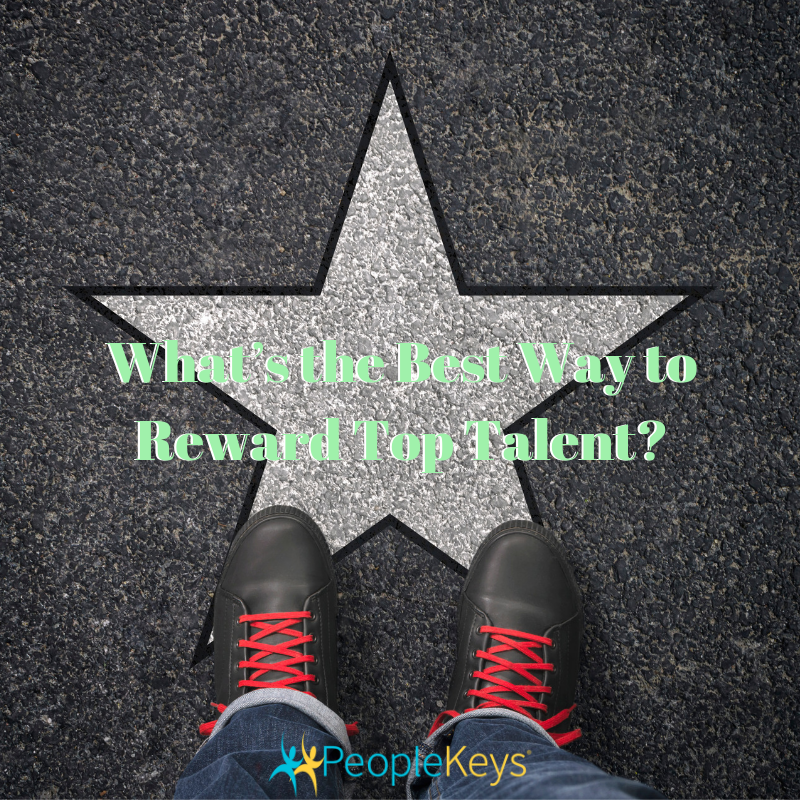
What’s the Best Way to Reward Top Talent?
Employee Incentives Work Best When Based on Personality
A little extra money is always nice. But for many people, a raise isn’t necessarily the perk they’re longing for. When you understand the personality of your employees, you can do a much better job of finding the right way to incentivize and reward each individual with exactly what they need to keep them happy, motivated, and committed to their job.
Author Daniel Pink, who created a popular TED talk on the subject of employee motivation and wrote the best-selling book Drive, explains the need for personality-driven employee incentives by saying that employees want to be “players, not pawns.” This means that employees want to feel valued and appreciated for their unique strengths, not just like a resource to be exploited. Pink also points out that most employees are at their best when they are given “autonomy, opportunity for mastery, and the belief that their task is meaningful.” But what does this look like in practice?
There are plenty of options to choose from when it comes to incentivizing employees. There are ceremonial, financial, and lifestyle-based perks, all of which have different impacts on employees depending on their personality type. The important thing to remember is that what inspires one person can just as easily leave another feeling indifferent.
Employees with Personality Style D
People with a D-style personality are task-oriented, driven, and like to see fast, tangible results. They have big personalities, are straightforward and open about their opinions, and like to be in charge.
D-style personalities like responsibility, autonomy, and being in charge of others. As an incentive, a promotion along with a new title and more authority is often a fantastic perk for D-style employees. Tangible rewards such as a special parking space can also be really motivational to D personalities. Even better, giving D-style employees the opportunity to choose their own projects (or swap projects with colleagues), will give them a welcome sense of empowerment and control over their future.
Of course, another great thing about people with a D-style personality is that if you’re ever unsure about how best to reward them, just ask. They know their own mind, and will happily tell you what they need. (Just be prepared to deliver on any rewards you promise fairly quickly—D personalities hate being kept waiting.)
Employees with Personality Style I
People with an I personality are creative, outgoing, and energetic. When inspiration strikes, they can come up with ideas and solutions that are absolutely ingenious. Too much structure, however, can stifle their creativity. This means that a great incentive for a creative I-style personalities might be a day off—“bonus days” that they can use whenever they like. They can take that time to do something for themselves, to recharge their batteries, to socialize, to travel… Whatever they want. It might initially seem counter-intuitive to reward productivity with time away from the office, but I personalities will love the freedom, and use the time to come back to work even more focused and inspired.
Whatever you choose, when incentivizing someone with an I personality try to think outside the box. Reward I-style employees with something imaginative and unconventional. Keep in mind that a social environment is very important to I personalities, and works wonders in stimulating their creativity. They enjoy public recognition, and activities that involves the whole team.
Employees with Personality Style S
People with an S-style personality are loyal, stable, and hard-working. They are excellent team players that always consider the good of the entire group before acting. They are family-oriented, and if they are happy in their job, will treat everyone at the office as a member of their extended family. They typically respond very well to any incentives that promote harmony within the office or that recognizes the importance of their home life. Thoughtful, personal gestures such offering on-site childcare or take-your-pet-to-work days are very appealing to S personalities.
Rewards given directly to the spouses of people with S-style personalities can have a great impact on employee morale, too, because it demonstrates respect for their families. For example, if an employee is consistently putting in long hours, a simple gesture like giving them a nice bouquet of flowers at the end of the day to deliver to their family is a thoughtful gesture that will mean a great deal to S-personalities.
Remember, too, that people with an S-style personality aren’t likely to ask for rewards or recognition. This doesn’t mean they don’t need or appreciate it. It does mean, however, that it will be up to you to anticipate what they need and initiate the process.
Employees with Personality Style C
People with a C-style personality are thorough, detail-oriented, and take great pride in delivering a quality product. They are also a bit more on the introverted side, and regularly prefer to work on their own. In fact, the kind of mastery that they like to achieve over a task or project often is more easily accomplished in a quiet environment. For a C-style employee, then, offering a telecommuting program can be the perfect reward for a job well done. You might begin by offering one day a month of telecommuting, with the opportunity to earn more as performance continues to be excellent. You will find that the C-style personality embraces the opportunity, and uses the time to become even more productive.
If telecommuting isn’t possible, consider a type of reward that taps into the C’s love of learning. Professional development opportunities, continuing education classes, and other academic perks will be well-received by a C.
Final Thoughts….
Asking employees to undergo a DISC personality test is the first step in determining what their personality type is, and how to best incentivize them. Consider this: According to 2012 data from The Society for Human Resource Management, over 70% of employers use personality tests as a part of the hiring process. But why limit the use of personality tests to just the recruitment stage? Once you’ve found the right person for the job, it makes sense to do everything in your power to keep that person on your payroll as long as possible. Understanding personality through DISC is the key to knowing what your employees want, and determining how to keep them productive and content for years to come.






